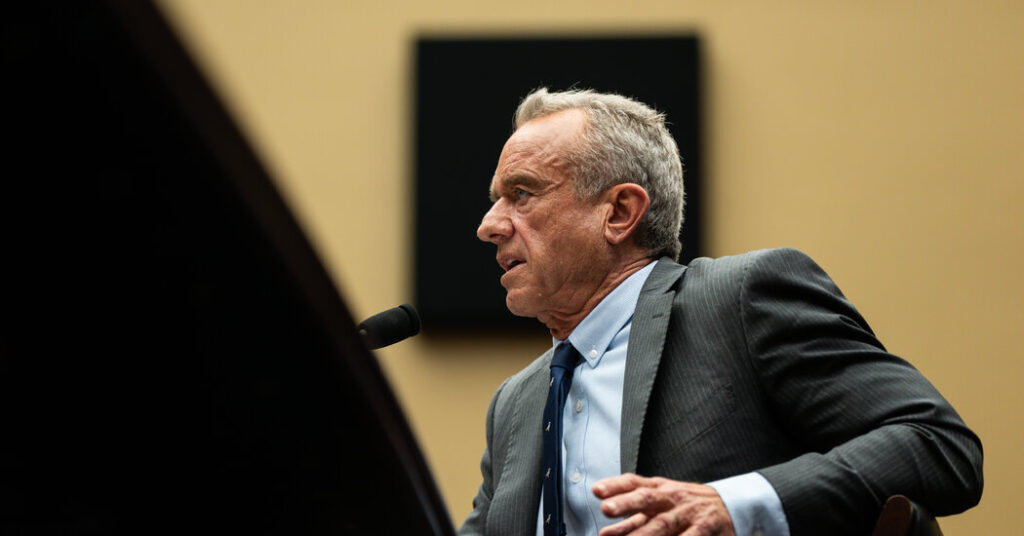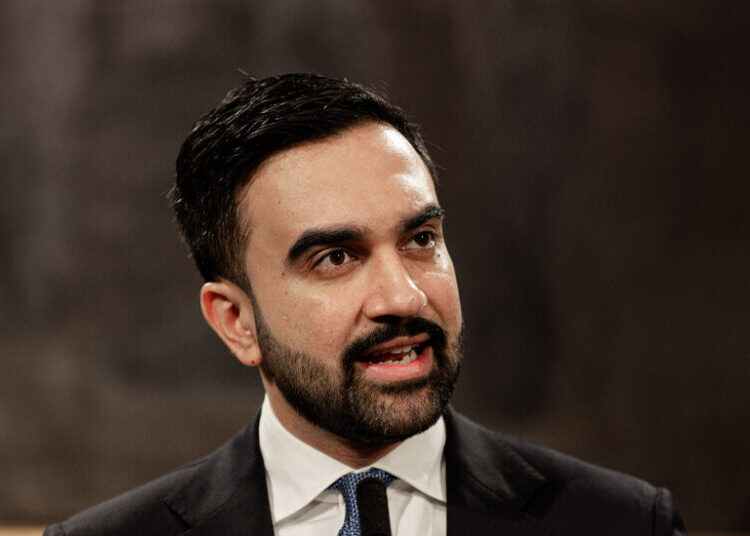Health Secretary Robert F. Kennedy Jr. said in an interview that he personally instructed the Centers for Disease Control and Prevention to abandon its longstanding position that vaccines do not cause autism — a move that underscores his determination to challenge scientific orthodoxy and bend the health department to his will.
In an interview on Thursday explaining why the C.D.C. website now says the claim that vaccines do not cause autism is not “evidence-based,” Mr. Kennedy acknowledged that large-scale epidemiological studies of the measles, mumps and rubella vaccine had found no link to autism, and that studies of the mercury-based preservative thimerosal had also shown no link.
But he cited gaps in vaccine safety science. He said he ordered the C.D.C. to change its guidance in part because high-quality large studies had not been conducted to examine a potential link between autism and other shots given in the first year of life. Those include the hepatitis B vaccine and a combination shot that protects against diphtheria, tetanus and pertussis, commonly known as whooping cough.
In his view, sweeping statements like “vaccines don’t cause autism” are unproven, and have been deployed by public health leaders who want to ease parents’ fears. He said he is not saying vaccines cause autism; he is simply saying there is no proof that they don’t.
“The whole thing about ‘vaccines have been tested and there’s been this determination made,’ is just a lie,” Mr. Kennedy said in the interview, his first with a major print publication. He added, “The phrase ‘Vaccines do not cause autism’ is not supported by science.”
It is highly unusual for a health secretary to personally order a change to scientific guidance. Former C.D.C. officials say that such changes are usually initiated by agency scientists, and in some cases might go to the secretary’s office for review. Mr. Kennedy’s intervention flows out of his two decades of vaccine activism, and demonstrates his intense interest in the topic even as other health issues, including the cancellation of insurance subsidies under the Affordable Care Act, are swirling in Washington.
Experts say Mr. Kennedy is correct, in a narrow sense, in saying that certain studies have not yet been done. But they say he is also asking for a level of proof that is difficult to achieve. As Dr. Arthur Caplan, who directs the medical ethics division at New York University, once wryly noted, “You can’t prove that Coca-Cola doesn’t cause autism either.”
Most mainstream public health leaders, including an official at the American Medical Association, a former C.D.C. director and the chairman of the Senate Health Committee, say the question of whether vaccines cause autism has been settled. Mr. Kennedy’s critics say he is cherry-picking facts and seeking studies to confirm his own predetermined conclusion.
By focusing on a theoretical, unproven risk, critics say, Mr. Kennedy is using his platform as health secretary to discourage vaccination, an issue that earned him millions of dollars and boosted his political career. They accuse him of playing on parents’ fears about autism, while ignoring incontrovertible evidence that vaccines have saved millions of lives.
“There is overwhelming evidence that vaccines do not cause autism but do save lives,” said Dr. Mandy Cohen, who led the C.D.C. during the Biden administration. She said the website change damages the C.D.C.’s credibility and “risks endangering children by driving down vaccination rates and leaving kids vulnerable to preventable diseases like measles and whooping cough.”
The website changes have once again put the secretary at odds with Senator Bill Cassidy, Republican of Louisiana and the health committee chairman, who is also a doctor. To win the senator’s vote for confirmation, Mr. Kennedy promised not to remove a statement from the C.D.C. website stating that vaccines do not cause autism.
The statement remains at the top of the site, with an asterisk leading to a footnote that says the header “has not been removed due to an agreement “ with the health committee chairman.
The page goes on to say that the claim is not “evidence-based” and that “studies supporting a link have been ignored by health authorities.” It does not mention the live-saving benefits of vaccines.
Mr. Cassidy, writing Thursday on the social media platform X, appeared incensed.
“I’m a doctor who has seen people die from vaccine-preventable diseases,” he wrote. “What parents need to hear right now is vaccines for measles, polio, hepatitis B and other childhood diseases are safe and effective and will not cause autism. Any statement to the contrary is wrong, irresponsible, and actively makes Americans sicker.”
Mr. Kennedy said in the interview that he had spoken with the senator about the website changes.
“I did talk to him,” Mr. Kennedy said of Mr. Cassidy. “He disagreed with the decision.” Mr. Cassidy has recently said he would like Mr. Kennedy to appear before his committee; the secretary said he would be “happy to.”
The introduction of routine childhood immunization is widely considered one of the greatest success stories of public health.
A study published last year in the medical journal The Lancet estimated that since 1974, when the World Health Organization launched its global vaccination program, vaccines had averted 154 million deaths worldwide, including those of 146 million children younger than 5. The C.D.C. has cited vaccines as one of the 10 great public health achievements of the 20th century.
Before the pertussis vaccine became widely available in the 1940s, for example, as many as 200,000 people got sick with whooping cough every year in the United States, and about 9,000 died, according to the National Foundation for Infectious Diseases. Before the measles vaccine became available in 1963, about 450 Americans died each year from the disease.
Dr. Sandra Adamson Fryhofer, a trustee of the American Medical Association, said the organization was “deeply concerned that perpetuating misleading claims on vaccines will lead to further confusion, distrust and ultimately, dangerous consequences for individuals and public health.”
Concerns about vaccine safety, which have percolated since the 1980s, intensified in 1998, after a British doctor, Andrew Wakefield, published a small study asserting that the measles, mumps and rubella vaccine might be linked to autism. That paper has since been retracted, and numerous studies — including a 10-year study of 600,000 children published in 2019 — have found no association.
A 2018 study that followed 82,000 pregnant women who were given the tetanus, diphtheria and pertussis vaccine found their babies were not at increased risk for autism.
However, Dr. Daniel Salmon, who directs the Institute for Vaccine Safety at the Johns Hopkins Bloomberg School of Public Health, said Mr. Kennedy was correct about the absence of high-quality, large-scale epidemiological research on autism and infants given the vaccines for hepatitis B and diphtheria, tetanus and pertussis. Dr. Salmon has long advocated greater federal investment in vaccine safety science.
“I think that there are gaps in science that need to be filled,” Dr. Salmon said. “We need a research agenda and we need to make it a priority to answer these questions, but it’s got to be done with rigorous science, and the science is really hard to do.”
Dr. Paul Offit, director of the Vaccine Education Center at Children’s Hospital of Philadelphia and a frequent critic of Mr. Kennedy, said that studies of the measles vaccine were prompted by the Wakefield paper. He said no reputable scientists had made similar claims that would warrant investigations into other vaccines.
“So what’s his hypothesis?” Dr. Offit asked, referring to Mr. Kennedy. “What is it about the hepatitis B vaccine that he thinks causes autism?”
Epidemiological studies, which look at large populations, show only associations and do not prove cause and effect. Mr. Kennedy argues that scientists must pay more attention to “vulnerable subgroups” of children who are not identified by such studies, and might be at risk for vaccine injuries. He also wants research into biological mechanisms or genetic factors that might make certain children vulnerable.
But the question of whether additional vaccine safety research is needed is separate from the question of whether children should be vaccinated, Dr. Salmon said.
In 1986, Congress passed a law, the National Childhood Vaccine Injury Act, that offered vaccine makers liability protection from lawsuits and required the C.D.C. to conduct a review of pertussis and rubella vaccines. (The pertussis vaccine that was in use in 1986 is no longer administered in the United States.)
Mr. Kennedy said in the interview that he ordered the website changes in part because the C.D.C. had not complied with that requirement.
Dr. Cohen, the former C.D.C. director, said the research had been done, pointing to a 1994 study by the Institute of Medicine, She said the C.D.C. carefully weighs all known benefits and risks before making vaccine recommendations.
But Mr. Kennedy asserted that the agency had not met the law’s directive to “post representations of science with the best, highest quality data.”
He noted that comprehensive reviews of existing vaccine safety science, including by the Institute of Medicine, have called for additional research into broad questions of vaccine safety.
The Informed Consent Action Network, a nonprofit led by Del Bigtree, Mr. Kennedy’s former communications director, lauded the website changes as vindication for parents who claim vaccines are a cause of their child’s autism. The group had sued the C.D.C. in 2020 demanding that the “vaccines do not cause autism” statement be removed.
Jessica Steier, a public health scientist who specializes in science communications, argues that in calling for additional research, Mr. Kennedy is following a well-worn playbook of his movement.
“Vaccine critics like Mr. Kennedy often give the impression that scientists haven’t seriously researched whether vaccines might cause autism,” Dr. Steier wrote in an August opinion piece in The New York Times. Her own review found “more than 40 high-quality studies since 1998 involving over 5.6 million people across seven countries,” she wrote. “All found no connection between vaccines and autism.”
Dr. Offit likened the secretary’s call for more studies to a never-ending “game of Whac-a-Mole” in which each time a question is answered, Mr. Kennedy and his allies raise new ones.
“They just keep moving the goal posts,” Dr. Offit said. The changes to the C.D.C. website, he said, are “unnecessarily scaring parents at a time when vaccine rates are already eroding.”
Mr. Kennedy suggested it is not his job to frame messages with an eye toward tamping down parents’ fears.
“I think the way to drive up vaccine utilization, ultimately, is to be honest with people,” he said, adding, “My job is not to gaslight Americans but to give them accurate information about the state of the science.”
Apoorva Mandavilli and Christina Jewett contributed reporting.
Sheryl Gay Stolberg covers health policy for The Times from Washington. A former congressional and White House correspondent, she focuses on the intersection of health policy and politics.
The post Kennedy Says He Told C.D.C. to Change Website’s Language on Autism and Vaccines appeared first on New York Times.



